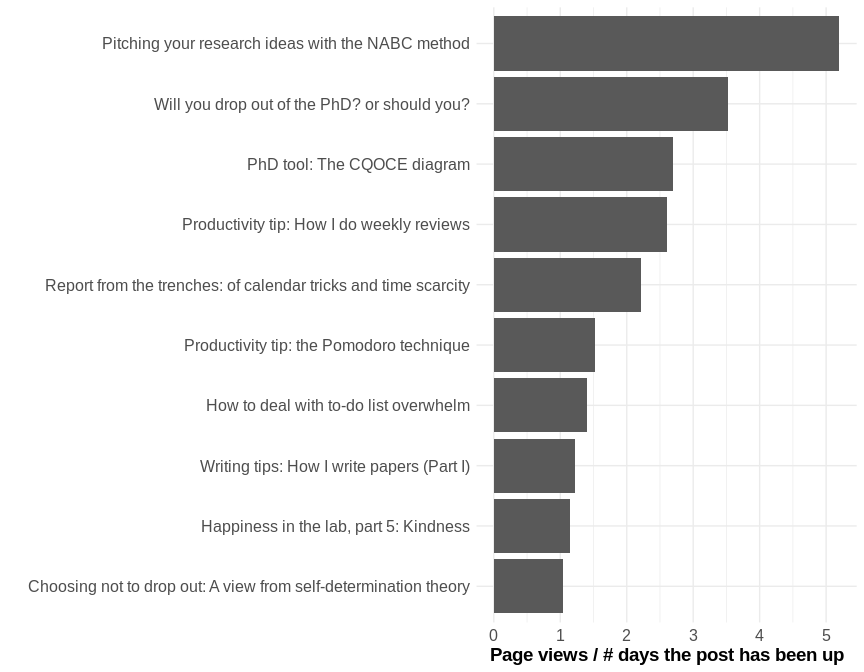POSTS
One year of 'A Happy PhD': What happened in 2019
by Luis P. Prieto, - 8 minutes read - 1559 wordsWow, does time fly by! During the Christmas and New Year’s hiatus, I had the chance to pause and review what has happened with the blog since I started it about one year ago. Read on if you want to know which were the most popular posts of 2019, where does this blog’s readership come from, and what lies in waiting for 2020…
‘A Happy PhD’ celebrates its first birthday!
As I stopped and took a breath or two to review the closing 2019 (you also do quarterly or yearly reviews, don’t you?), I was amazed by the realization that one year had gone by since I started this blog. It feels like only yesterday I was reading through the latest research to understand whether studying a PhD made you more prone to depression, after a couple of shocking articles in the press, and a couple of personal episodes that highlighted the crucial (and often hidden, almost taboo) importance of mental health in academic research, especially at the beginning of it (this led to the first post in the blog).
Over the past year, I have explored some of the latest research and advice on mental wellbeing for PhD students in 29 posts (this one is #30), along with other topics that I felt were important and not often talked about, from productivity tricks to conceptual tools to make sense of the thesis, or writing and communication strategies. Some posts were so long I had to make them into multi-part series; others, just pocket-sized reminders or mantras… Not too bad, I guess, for a busy academic, but I have the nagging feeling that I could have written so much more, that I still need to dig deeper into so many unexplored topics (read at the end for some ideas).
What topics did we learn about in 2019? here is the tag cloud of topics, with size representing how many times they have been addressed in posts (see here for a clickable version):
Some of the ideas, tricks and solutions featured in the blog also spilled over into The Real World™ (i.e., beyond moving bits and pixels in your screen), as I had the chance to organize or co-organize doctoral training events around some of the same topics mentioned in the blog. I found these trainings both real fun and tremendously enriching. For example:
- A workshop on productivity in the PhD, at Nelijärve, Estonia, in February
- A workshop on progress in the PhD, both for PhD students and for PhD supervisors, at Tallinn University, Estonia, in December1
… plus, I also had the extreme luck to meet some of you in person, which allowed us to share both the few things I’ve learned along the way, and the challenges that many of you face as you try to complete your doctorates. I’m tremendously grateful for these opportunities and I will do my best to keep coming across them (and across you).
Some numbers, and 2019’s top 10 posts
So, there have been 29 posts in 2019, more or less one every two weeks. This is a lower frequency than I originally aimed at (weekly posts) but, on the other hand, I also got remarks by some readers saying that they have a hard time keeping up with all the writing I was putting out (makes sense, PhD students are normally a busy bunch). So… maybe once every two weeks is not such a bad rhythm after all? if you disagree, let me know in the comments below!
Regarding the readership, and according to my Google Analytics stats, throughout 2019 ‘A Happy PhD’ got slightly over 10,000 pageviews, from a bit less than 4,000 different users. The real shocker for me was the fact that, among these readers, I could find people from up to 112 countries (!). I’m really humbled and grateful that some of the ideas I was tentatively putting out there, have reached so far and wide. Out of these 112 countries, the top 5 countries where most of you come from (or rather, accessed from) seem to be: USA (18%), Spain (13%), UK (5%), Australia (5%), and Estonia (4%). We can see a big-English-speaking-country bias (to be expected, since the blog is written in English)… plus Spain and Estonia, the two European countries where I have spent most time doing research (and I have the most contacts from).
Just for fun, I also compiled the most popular posts of 2019 (i.e., the ones with most views, normalized by the time each of them has been up – of course, the older posts have been visited more in absolute terms). These are, in descending order of popularity:
- Pitching your research ideas with the NABC method – a simple method to structure your research presentations or “pitches”
- Will you drop out of the PhD? or should you? – a revision of the most important factors associated with dropping out of the PhD
- PhD tool: The CQOCE diagram – a conceptual tool to have a clear, overall view of your thesis work
- Productivity tip: How I do weekly reviews – one of the most underrated productivity techniques, to help you find a sense of progress, crystallize what you learn, and keep you focused on important goals
- Report from the trenches: of calendar tricks and time scarcity – a report on my trying out of a new productivity trick I learned recently, ditching your to-do list altogether and using your calendar app as a substitute
- Productivity tip: the Pomodoro technique – my take on the classic technique to find focus and stop procrastination, and how to use it in the PhD
- How to deal with to-do list overwhelm – going over several practices to tackle one of the most common productivity problems of many PhD students (and academics in general), including the trick I mentioned in #5 above
- Writing tips: How I write papers (Part I) – Part of the series on how to write scientific papers, this post describes how I start (collaboratively) writing my papers, from the initial idea to a good outline of the contents
- Happiness in the lab, part 5: Kindness – The closing post of the series on the science of happiness at work, dealing with how to develop kindness to enrich your research work
- Choosing not to drop out: A view from self-determination theory – Another post on research about doctoral dropouts, focusing on some of the factors that you actually have control about
What lies ahead for A Happy PhD
The “top 10” above shows that people are interested in all the different areas I touch upon with the blog (doctoral productivity, wellbeing, transversal skills). Hence, I don’t think I will change radically the direction of the blog for now. There are, however, a few novel things I would like to try in 2020, including:
- Increasing the number of live training events (e.g., workshops for doctoral students) about the issues and ideas developed in the blog. These are enormously fun, and allow me to better understand PhD student struggles, and also their resourcefulness. Do you think your university or doctoral school would be eager to host such an event? Feel free to drop me a line and let me know.
- Doing a bit of actual research about how to support PhD students in better progressing towards the dissertation. This includes both what to do (practices), and also some tools and technologies that may be helpful in the process. We are already running PhD student and supervisor workshops in Tallinn (Estonia) and Valladolid (Spain), to better understand the problem and solution space. I will keep you posted on these ideas, our findings and any experimental piloting we open, on later posts!
- I’ll try to make posts themselves more regular (weekly, maybe?), but also shorter and to the point, to cater for your typically busy schedules.
- I also would like to expand the audience of the blog, so that these (hopefully useful) ideas reach as many PhD students as possible. Yet, I am no social media expert here, so any advice or suggestions on how to best grow our little community, will be very welcome ;)
- And, of course, I would like to continue learning new things about doctoral studies and doctoral supervision, and how to help others complete (and enjoy) that journey. I would like to explore and dive deeper into topics I was not able to address in 2019. Topics like: the influence of sleep, mobile devices, or mindful acceptance, on our health and productivity as researchers; different doctoral supervision styles and their relative effectiveness; impostor syndrome, fear of planning and other common candidate foibles; useful everyday practices, from journalling to effective thesis meetings with your supervisors; more mantras; more thesis conceptualization tools; more self-experiments on productivity (to try for myself, or for yourselves to try), and so many more…
It’s gonna be a fun year.
Do you have other ideas for post topics, long-ranging series, short mantras, productivity tricks or deeper dives, which could help your fellow PhD students or supervisors? Let me know in the comments below!
-
A post about the topics and lessons learned in these workshops is coming very soon, stay tuned! ↩︎

Luis P. Prieto
Luis P. is a Ramón y Cajal research fellow at the University of Valladolid (Spain), investigating learning technologies, especially learning analytics. He is also an avid learner about doctoral education and supervision, and he's the main author at the A Happy PhD blog.


